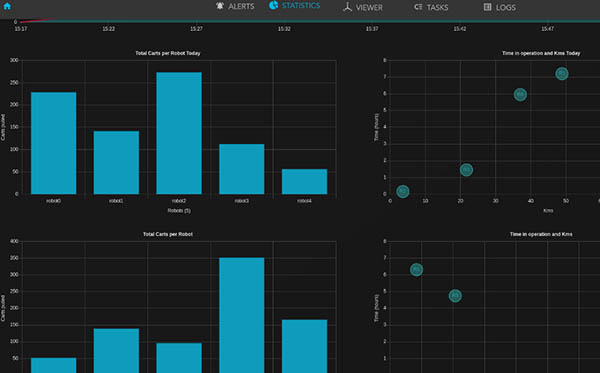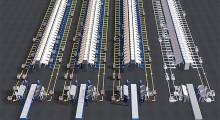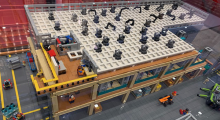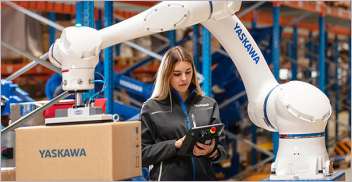Getting autonomous mobile robots, or AMRs, to handle more dynamic environments requires a combination of technologies. MOV.AI and Lanner Electronics today said they have integrated Lanner's Edge AI computing appliance, MOV.AI's Robotics Engine Platform, and the NVIDIA Isaac robotics platform. The integration will give AMR manufacturers and integrators a robust platform to speed up development, improve operational efficiency, and optimize robot performance, they said.
“Our expertise in creating NVIDIA-optimized edge computing servers, combined with MOV.AI's state-of-the-art AMR software powered by NVIDIA edge AI and robotics technologies, provides an off-the-shelf platform to build enterprise-grade autonomous robots for today's challenging industrial environments,” said Jeans Tseng, chief technology officer of Lanner Electronics.
“We are confident that our AMR platform will enable service providers and manufacturers to quickly deploy the top-performing AMR solution to the industrial IoT [Internet of Things] applications,” he said.
Lanner Inc. said it is a leading hardware provider. The New Taipei City, Taiwan-based company offers design, engineering, and manufacturing services for advanced network appliances; ruggedized in-vehicle, industrial computers; power substation computers; and edge AI appliances.
Lanner Electronics looks to improve integration
Modern warehouses pose unique challenges for automation, said the partners. Physical repetition, lack of distinctive features, or frequently changing items are a challenge for perception and navigation systems. Multiple robot types performing different tasks create synchronization and fleet management challenges.
In addition, management systems and IoT devices require numerous integrations, according to Lanner and MOV.AI. “Humans introduce uncertainty, while new connected systems require security measures, policies, and update methods that are not ingrained in traditional robot systems,” the companies said.
MOV.AI and Lanner said their joint offering provides robot developers with high-performance hardware, hardware-optimized robotics software development kits (SDKs), and a visual integrated development environment (IDE) that wraps it together to speed up development.
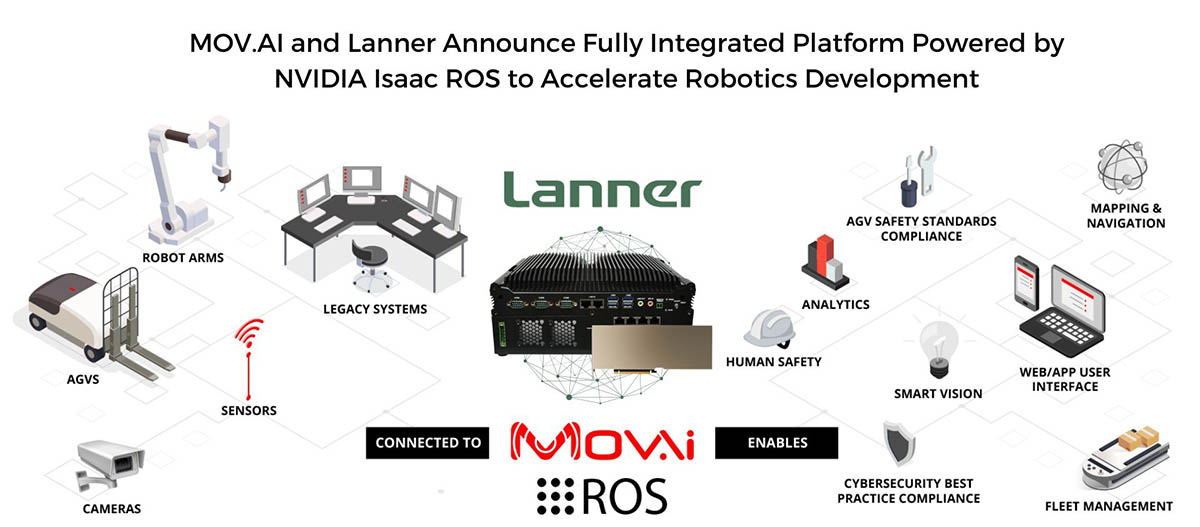
NVIDIA provides Isaac ROS GEMs
The new system uses Lanner's EAI-I130 NVIDIA Jetson-based edge AI computing appliance and MOV.AI's Robotics Engine Platform, which incorporates NVIDIA Isaac ROS GEMs. The Robot Operating System (ROS)-based GEMs are hardware-accelerated packages for perception, simultaneous localization and mapping (SLAM) navigation, image processing, and more.
Optimized for AI functionality, performance, and ease of deployment, Lanner said its Edge AI appliances are NVIDIA NGC-ready, compatible with NVIDIA graphics processing units (GPUs).
Developers can drag and drop the NVIDIA Isaac ROS GEMs directly in the MOV.AI development tools to quickly build high-performance robots.
MOV.AI works to ease AMR development, deployment
“This is exciting on several levels. First and foremost, the integration allows fast time to market for a superior product that meets the needs of today's warehouse automation challenges,” stated Motti Kushnir, CEO of MOV.AI. “Logistics is a $9 trillion industry, and automation is playing an important role in its optimization.”
“Second, from MOV.AI's perspective, this is a huge achievement,” he added. “NVIDIA, with its Isaac platform, is a major force in the robotics industry, continuously driving it forward. Together with Lanner, we are honored to partner to provide the robotics community with the tools they need to create robots that deliver value quickly and continuously.”
MOV.AI said it provides AMR manufacturers and integrators with the tools they need to create enterprise-grade robots quickly, allowing users to benefit from flexible automation. The Tel Aviv, Israel-based company said its Robotics Engine platform is based on ROS and packaged in an intuitive Web-based interface.
The platform “contains everything needed to build, deploy, and operate intelligent robots,” claimed MOV.AI, which added that it “completely changes the way [AMRs] are developed, in terms of time to market, cost, and flexibility.”
Article topics
Email Sign Up

